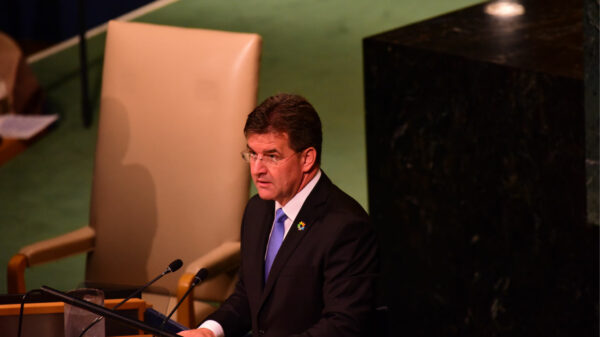*Prepared by: Fitim Gashi
The publication of an audio recording by "Paparaci," featuring a conversation between the head of Vetëvendosje's parliamentary group, Mimoza Kusari-Lila, and Milan Radoicic, who for many years was a key figure in northern Kosovo and is linked to crime and corruption, has sparked controversy and clashes. The audio dates back to June 2022, during a period when Radoicic was wanted by Kosovo’s law enforcement authorities due to suspicions of involvement in the assassination of the well-known Serbian politician, Oliver Ivanovic. The conversation, which begins between Kusari-Lila and the former leader of the Serb List deputies, Slavko Simic, eventually includes Radoicic, who was then in hiding. The discussions revolve around political matters, including the vote on the Minimum Wage Law, which was widely opposed by the opposition, and the appointment of a Constitutional Court judge.
Kusari-Lila herself denied any potential deals with the Serb List, calling the audio recordings manipulated through Artificial Intelligence and part of a smear campaign against her. According to her, the conversation was about electricity issues in the north, where "Milan Radoicic unilaterally offered to guarantee security for KOSTT officials, who were scheduled to meet their counterparts from ‘Elektrosever’ at the Vallaq substation." She claims this was the only time she communicated with him.
Prime Minister Albin Kurti did not address the fact that Kusari-Lila spoke with Radoicic while he was being pursued by Kosovo authorities. Instead, he defended the head of Vetëvendosje's parliamentary group, stating that the release of these recordings is part of a hybrid war against Kosovo, aimed at destabilizing his government. For the ruling party, this is all part of a disinformation and propaganda campaign against efforts to extend the rule of law and sovereignty across the entire country.
Hybrid warfare involves disinformation, cyberattacks, propaganda, and other means, aimed at destabilizing a state, fostering divisions, and undermining democratic institutions, often surfacing during times of heightened tensions.
In the latest case, Kusari-Lila has not denied the existence of the conversation but claimed that parts of it were manipulated or taken out of context. If they were indeed manipulated, it is up to the relevant judicial authorities to verify, as Kusari-Lila has already filed the case. Since the recordings include real discussions, even if interpreted differently, this is not a classic case of disinformation typically seen in hybrid warfare.
Another important aspect is that the release of such recordings, which have been made public by the media before, holds significance for transparency, especially when they involve politicians and touch on matters of public interest. The disclosure of these recordings can be seen as exposing questionable political decisions; in the past, issues like party-based employment or the appointment of judges were revealed, and now the discussion revolves around the Minimum Wage Law and the appointment of a Constitutional Court judge.
The exposure of scandals through audio recordings is one of the methods used in countries that claim to be democracies and cannot necessarily be considered actions that destabilize the country, even when their publication damages the reputation of politicians or parties.
This does not automatically constitute hybrid warfare.
The public has the right to be informed about the actions of decision-makers, and often, the revelation of conversations can be seen as part of internal political struggles rather than an orchestrated attack from outside. So far, there is no clear evidence that the publication of these recordings is part of a broader strategy by an external force. When recordings contain facts of public interest, they are seen more as informative.
In recent years, it has become common to mention hybrid warfare in the context of internal developments, as a way to dismiss findings or intimidate others whenever the authorities find the reports inconvenient. Media analysts also note that hybrid warfare is often misinterpreted by politicians, who use it to challenge the work of the media when it concerns the Government, Parliament, or, in this case, Vetëvendosje's parliamentary group.
In the case of hybrid warfare, one of the key elements is the spread of false or manipulated information with the aim of creating chaos or division. If it is confirmed that the conversation is genuine, regardless of how it is interpreted, it is difficult to classify it as propaganda for hybrid purposes.
Hybrid warfare also involves coordinated and multidimensional attacks, combining various techniques and operations to undermine a state's sovereignty and stability.
There have been instances where Serbia and Russia have employed such tactics against Kosovo. Alongside the invasion of Ukraine, Russia has aggressively spread disinformation about Kosovo and the Balkan region. Russian propaganda mainly targets the Serb community in Kosovo, aiming to deepen ethnic polarization. This includes promoting false narratives about the treatment of Serbs in Kosovo and portraying the Albanian majority as hostile towards them.
If the aim behind the recordings is to manipulate public opinion or deepen ethnic and political divisions, this could pose a significant risk, especially in the context of the unresolved situation in the north and the ongoing dispute with Serbia. For this, evidence and proof are needed, which official authorities should provide, as well as clarify whether the latest audio recording is part of this hybrid warfare.
The debate surrounding Radoicic reignited just weeks after the State Prosecutor filed charges against the group responsible for the terrorist attack in Banjska, Zvecan, on September 24, 2023, which resulted in the killing of Kosovo Police Sergeant Afrim Bunjaku. The organizer of this attack was Milan Radoicic, the former vice-president of the Serb List.
In recent years, there has been a tendency to reduce the broader relations between the majority Albanian community and the minority Serb community to the debate over the roles of Radoicic and the Serb List.
There is a narrative consistently promoted by the ruling party that they never cooperate with the Serb List, frequently accusing the "old regime" parties of being dependent on a group controlled by official Belgrade. However, the audio recording revealed that, in certain circumstances—at least while the Serb List was part of the institutions—cooperation between Vetëvendosje (LVV) and the Serb List did occur, which is entirely normal.
The Serb List represents the Serb community in Kosovo's Assembly, and their involvement in decision-making, as well as coordination with them on legislative agendas or policies concerning this community, should not be viewed as problematic, nor should it be used as a tool to accuse others. What becomes problematic is when decision-making involves actors who evade Kosovo’s justice system, as is the case with Radoicic.
While Kurti and Kusari-Lila claim the recordings have been manipulated and recycled to cause political harm, the opposition argues this is not propaganda. Instead, they believe the content exposes LVV’s true, coordinated approach with the Serb List, even attacking the opposition in the process. The opposition has called on the ruling party to clarify whether, in exchange for Serb List votes, they met the conditions set by Radoicic, who can be heard telling Kusari-Lila: "You need to check with your boss."
The debate sparked by the audio recordings highlights the ongoing influence of Radoicic, even though he is physically absent from Kosovo due to legal reasons. Despite being a controversial figure with a criminal past, his name surfaces during critical political moments, indicating that his role extends beyond mere criminal activities.
From what has been seen so far, and with increasing warnings as the election date approaches, Milan Radoicic may remain a central figure around which the internal political battle will unfold.
The focus on issues where Radoicic is believed to have had influence in the past demonstrates that much of the political narrative revolves around his actions and alliances.
The release of audio recordings involving officials from the ruling party, along with warnings from the same officials that photos exist showing other politicians frequenting Radoicic's premises, could impact the pre-election campaign in Kosovo.
"Imagine when the photos from the inauguration of Radoicic's house come out, imagine when the gifts for Radoicic's children from officials and leaders are revealed, imagine who visited and who had business dealings," Kusari-Lila said during the session where this issue was debated.
If these materials are published during the campaign by the ruling party, they could deal a blow to rival parties, especially those suspected of collaborating with Radoicic.
This could shift focus away from discussing internal and external challenges that affect citizens' well-being and Kosovo's strengthening of its international standing.
*This article is published as part of the Western Balkans Regional Initiative against disinformation. “Western Balkans Anti-Disinformation Hub: exposing malign influences through watchdog journalism.”



























































